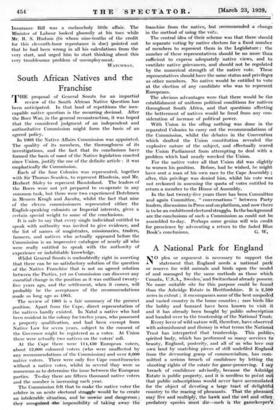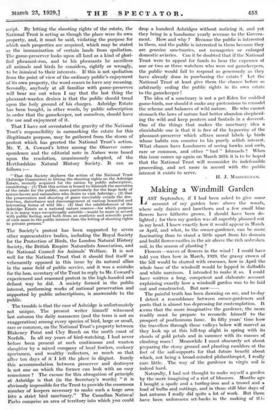A National Park for England
NO plea or argument is necessary to support the statement that England needs a national 'mirk Or reserve for wild animals and birds upon the model of and managed by the same methods as those which Canada, U.S.A., Sweden; and Switierland already possess: No more suitable site for this purpose could be foUnd than the Ashridge Estate in Hertfordshire. It is 2,500 .
acres in extent ; it encompasses some of the best unspoiled, and varied country in the home counties ; rare birds like the hobby and .bukzard have been known to visit it and "it has already been bought by public subscription . and handed over to the trusteeship of the National Trusts Every lover of wild nature Will; therefore, have observed with astOnishrnent and disinay in what terms the National. Trust has interpreted • that trusteeship. This public.s spirited body, Which has perfornied so 'many services to beauty, England, posterity,' and all Of us Who love oug own land by snatching pieces of still undefiled England fiom the devouring grasp of commercialism, has coni7 mitted a serious breach of confidence by letting the shooting rights of the estate for game-preserving. I saSt breach of confidence advisedly, because the Ashridge, Estate is public property, and it it needless to point on§ that public subscriptions would never have accuinulated for- the Object of devoting a latge triet or delightful country to the `rearing Of pheasants. That the pheasant May live and multiply, the hawk and the Owl and otheg predatory -species Must die---sueh is the gainekeepeei, script. By letting the. shooting rights of the estate, the National Trust is acting as though the place were its own property, and, it must be said, violating the purpose for which such properties are acquired, which may be stated as the immunization of certain lands from spoliation. The game-preserver looks upon all land as a kind of glori- fied pheasant-run, . and to his pheasants he sacrifices all animals and birds he considers, rightly or wrongly, to be inimical to their interests. If this is not spoliation from the point of view of the ordinary public's enjoyment of its own property, the word ceases to have any meaning. Secondly, anybody at all familiar with game-preserves will bear me out when I say that the last thing the pheasant-warden desires is that the public should tread upon the holy ground of his charges. Ashridge Estate has been bought, in other words, by public subscription in order that the gamekeeper, not ourselves, should have the use and enjoyment of it.
That I have not overstated the gravity of the National Trust's responsibility in earmarking the estate for this illegitimate purpose, may be gathered from the storm of protest which has greeted the National Trust's action. Mr. T. A. Coward's . letter among the Observer corre- spondence and the editorial note in Nature were based upon the resolution, . unanimously adopted, of the Hertfordshire Natural History Society. It ran as follows :— .
" That this Society deplores the action of the National Trust (Ashridge Committee) in letting the shooting rights on the Ashridge Estate, recently acquired for the nation by public subscription, considering : (1) That this action is bound to diminish the amenities of the estate for the public, more particularly for the large body of nature-lovers and naturalists who desire to visit Ashridge ; (2) that the preservation and shooting of game inevitably entails the des- truction, disturbance and discouragement of various beautiful and interesting forms of wild life ; (3) that the establishment of the Ashridge Estate as a national nature reserve—for which purpose it is in many ways exceptionally suitablewould be more in accord with public feeling, and both from an aesthetic and scientific point of view more in the public interest than the letting of shooting rights to private persons."
The Society's protest has been supported by seven other representative bodies, including the Royal Society for the Protection of Birds, the London Natural History Society, the British Empire Naturalists Association, and the National. Council for Animals' Welfare. It is not well for the National Trust that it should find itself so vehemently opposed in this issue by its natural allies in the same field of public service, and it was a mistake for the hon. secretary of the Trust to reply to Mr. Coward's experienced and reasoned protest in the high:handed and defiant, way he did: A 'society formed in the public interest, performing works of national preservation and supported by public Subscriptions, is .answerable to the public. • The trouble is that the case of Ashridge is unfortunately not unique. The present writer himself witnessed, fast autumn the daily massacres (and the term is not an exaggeration) among„ every species of bird, large or small, rare or common, on the National Trust's property between Blakeney Point and Cley Beech on the north coast of Norfolk. In all my years of bird watching, I had never before -been present at such continuous. and wanton slaughter by a mixed company of local_ fowlers, cockney sportsmen, and wealthy vollectors, so .much so that after ten days of it. I left. the place in &Vint. Surely this accornmOdation between preserver and destroyer is not one on which the former can look with an easy conscience ? The excuse for this abrogation of principle. at Ashridge is that (in the Secretary's words) " it is obviously impossible for the Trust to provide the enormous number of keepers necessary to make such a large area into a strict bird sanctuary." The Canadian .National Parks comprise an area of territory into which you could drop a hundred Ashridges without noticing it, and yet they bring in a handsome yearly revenue to the Govern- ment. How and why ? Because the public is interested . in them, and the public is interested in them because they are genuine sanctuaries, not menageries or enlarged domestic aviaries. Can it be doubted that if the National Trust were to appeal for funds to bear the expenses of one or two or three watchers who were not gamekeepers, the public would fail to respond as generously as they have already done in purchasing the estate ? Let the National Trust at least give them the chance before so arbitrarily ceding the public rights in its own estate to the gamekeeper !
The idea of a sanctuary is not a pet-Eden for coddled game-birds, nor should it make any pretensions to remodel the scheme and balances of wild.nature. He who cannot stomach the laws of nature had better abandon shepherd- ing the wild and keep pouters and fantails in a dovecot. One of the things that makes the sanctuary idea a cherishable one is that it is free of the hypocrisy of the pheasant-preserver which affixes moral labels t,o birds whose habits run counter to his purely selfish interest. What chance have Londoners of seeing hawks and owls, rare or common, and other " bad " Ishmaels ? When this issue comes up again on March 26th it is to be hoped that the National Trust will reconsider its indefensible proceeding, and act more in accord with the public interest it exists to serve.
. H. J. MASSINGIIAM.

















































 Previous page
Previous page